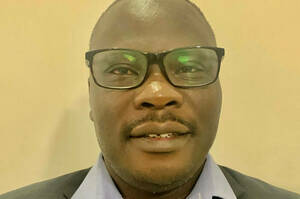
Amollo Amollo is Technical Director for the Africa Region at Mercy Corps. He chose to study peace at the Kroc Institute after observing political violence in his home country of Kenya and his experiences in working toward peace there. While at Notre Dame, Amollo loved the diversity of campus life and the ability to connect with professionals with different backgrounds and experiences who were equally passionate about increasing justice across the world.
As a young adult, Amollo lived in Kenya when it was under a single-party dictatorship. In the early 2000s, his country experienced a wave of widespread change when people across the country started pushing for more freedoms. In response, government officials tried many methods to incapacitate these popular movements.
“To prove that democracy could not work in Kenya, the government and political actors provoked ethnic-based violence among different groups,” Amollo says. The point was to show that in a diverse country, political competition would heighten ethnic competition and lead to violence.
“I was a university student then, so as students, we had a certain leeway because we could be critical of the government without being punished as much as others,” said Amollo. “We decided to create theater plays and go out to communities to present them, critique the government, and call upon citizens to be peaceful among themselves.”
Through theater, Amollo and his classmates found a popular way to communicate their message of the importance of peacebuilding and intra-ethnic cooperation. After graduation, Amollo and his classmates founded an organization called Amani Peoples Theatre. Through Amani, they generated engagement among people across Kenya, especially around issues like peacebuilding and the importance of human rights.
Although this work was fulfilling, Amollo began to feel he needed deeper knowledge and more theoretical framing to better advance his peacebuilding practice. He met Cynthia Mahmood, a former faculty member at the Kroc Institute, who encouraged him to apply to the Master’s in International Peace Studies program at the Kroc Institute. Not long after, the Kroc Institute sent an intern to the Amani Peoples Theatre, and this confirmed his interest in pursuing studies at Notre Dame. One year after the intern arrived, Amollo was admitted to the M.A. program.
A highlight of his time at the Institute was learning from his fellow classmates.
“During my studies, I really enjoyed the ability to meet students from different backgrounds and cultural settings and to listen to them,” he recalls. “I saw the power humanity can have when you accept diversity and take advantage of it.”
After graduation, Amollo returned to Kenya and worked with the Jesuits as a senior program officer dealing with issues related to conflict, human rights, and peacebuilding. He also worked with Saferworld and the International Rescue Committee (IRC) before joining Mercy Corps as a program coordinator. Since joining Mercy Corps, he has worked in different roles and countries. on issues ranging from conflict transformation and governance to human rights to preventing election-related violence. Currently Amollo is based in Nigeria, where he works as a technical director for the African region.
Throughout his career, Amollo has handled multi-million-dollar projects aimed at strengthening resilience and security across different regions in the world.
“Working for the sanctity and dignity of human life–that is what keeps me hooked completely to this work,” he says.
Amollo sees a number of peacebuilding challenges in Africa.
“We work in highly fragile environments, so we have to be up to speed with the needs of the population,” he says. “The governance structures that we have in place are just not the right ones to ensure human dignity and address corruption.” He also highlights the challenges of daily violence, gender inequality, racism, and abuse by some large corporations who often mistreat their workers and violate safety protocols.
An overarching issue that Amollo sees as connecting all of these challenges is the gap between theory and practice and the difficulty of localization. Instead of having international organizations doing things for local communities, he emphasizes that it is essential to build capacity for local communities to introduce and drive changes themselves.
“We see that these things [conflicts and inequalities] end on paper,” Amollo concludes. “The academic side of peacebuilding has really advanced, but the capability to implement it effectively and to achieve the transformation we are looking for is still a struggle. We need people like John Paul Lederach to link theory and practice so they grow in tandem.”
Amollo still follows the news from the Kroc Institute and is in touch with a number of his former classmates.